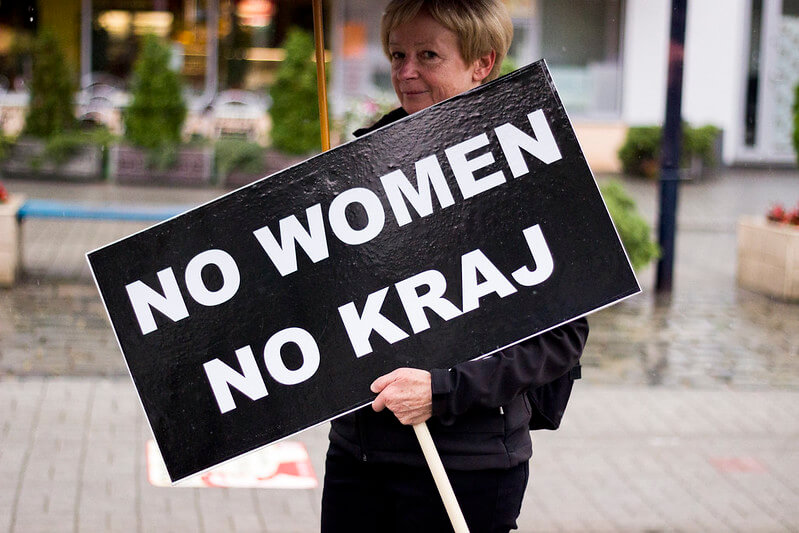As we walk by the hospital in the early afternoon drizzle, Małgorzata Adamczyk points to an empty parking space across the street. “That’s where they usually park the van with the posters,” she says. There’s nobody there today, but Adamczyk, a local feminist activist, explains that anti-abortion protestors will usually camp out in that lot to harass doctors and patients at one of the few remaining legal abortion providers in Warsaw.
These types of street protests aren’t uncommon in Poland; they are part of a larger, coordinated movement to undermine what little access to abortion remains in one of Europe’s least abortion friendly countries.
And it is because of this increasing conservative pressure on reproductive rights — spearheaded by the government — that feminist groups worry about a chilling effect among Polish activists and voters ahead of this year’s October 13 parliamentary elections.
A climate of fear
Since coming to power in 2015, the conservative Law and Justice party (PiS) has significantly narrowed Poles’ access to reproductive care, not only by attempting to institute a complete abortion ban but also by tightening restrictions on access to contraceptives, comprehensive sex-education, IVF treatment, and even epidural anesthesia. And while popular protests — like the 2016 Black Monday protest — have stymied some of PiS’s most extreme legislative proposals, the government has still been able to use its parliamentary majority to defund and harass women’s rights groups as well as create a climate of fear among doctors.

“This climate is making doctors less and less willing to obey the law and perform legal abortions,” says Liliana Religa, the public relations officer for the Federation for Women and Family Planning — a reproductive rights NGO. “Doctors are afraid that they will get punished because someone will assume that [the abortion] … did not meet the [legal] criteria.”
It is not an idle concern. Although in Poland, women who receive abortions cannot be prosecuted, anyone who assists in obtaining an illegal abortion can be jailed. And while discouraging abortions outside the legal system, the government has also made it increasingly difficult to access safe and legal care. According to a 2017 paper, around 200,000 Poles receive an abortion each year yet only 1,055 legal abortions were recorded in 2016: .5 percent of the total.
Despite being available upon-request during the 1960s and 70s, abortion in Poland has been increasingly restricted since the fall of Communism due — in part — to the conservative nature of Polish society and the resurgent political role of the Catholic Church.
Currently, abortion is legal only under three exceptions: if the pregnancy is a danger to the health of the mother; if the pregnancy is the result of rape or incest; or if the fetus is significantly deformed. However, the latter case accounts for close to 95 percent of all Polish abortions and is where the most restrictive changes have happened. In part due to fear and in part to a conservative “conscience objector clause” policy, Polish doctors have become increasingly reluctant to provide abortions — even when they are legal and medically necessary.
“In reality, at the moment it’s — I would say — almost impossible to have legally permitted abortion executed in any hospital,” President of Congress of Polish Women Anna Karaszewska explains. “[Even] with the real cases when there is a serious fetal deformation or malformation diagnosed or a women’s life and health [are] put at risk, the doctors, the hospitals refuse to execute an abortion and women in such cases are left on their own without any help or any alternative hospital or clinic where they can have that option.”
Billed as a protection for religious doctors, the “conscience clause” has provided a loophole for anti-abortion activists to eliminate abortion access in large parts of the country by either convincing or intimidating medical providers into not offer the procedure. Doctors, nurses, or even hospitals may then simply refuse to perform an operation and are under no obligation to refer patients to a doctor that will.
“Imagined that you go to the doctor with anything, like heart problems. And the doctor tells you, sorry, I can’t treat you because it’s against my religion. Right? It’s impossible,” Magdalena Biejat, a leftist parliamentary candidate, says. “And it’s exactly what’s happening with legal abortion right now. It’s something that we’re paying for with our taxes together and most of the population can’t get it at all.”

Seeking an alternative
For many in Poland, a legal abortion is not a realistic option. So Poles turn to three other methods to get care: finding a sympathetic doctor willing to do the abortion illegally, traveling abroad, or ordering abortion pills online from other countries.
It is hard to track how many people in Poland actually receive abortions in Polish hospitals or clinics since many sympathetic doctors simply don’t report the operation or report it as something else.
“If you are able to find a doctor [or] hospital that will be able to give you a legal abortion, many times they won’t file it as a legal abortion. They file it, for example, as a natural miscarriage,” Biejat says. “Because they’re afraid that ‘I may lose funding’, that they may be stigmatized, that they will have anti-choice protesters in the windows.”
Likewise, it is not known exactly how many Poles go abroad each year in order to get an abortion — although that same 2017 paper places the number near 20,000. Most go to nearby EU countries where they are often helped by feminist groups on the ground like Ciocia Basia (Aunt Betty) in Berlin, Germany.
However the exact country someone may choose, as Berenika Lewiki — a Ciocia Basia member from Poland — explains, depends on the stage of the pregnancy as well as personal financial ability.
“When somebody contacts us, we ask, which week is this person pregnant and then when it’s still early pregnancy, we give them some contacts … so they can order pills directly by themselves because it’s cheaper and more convenient,” Lewiki says. “And when its already too late that they cannot order pills, then we organize an abortion [in Berlin]. When it’s later than 12 weeks so they cannot perform the abortion in Berlin, then we connect them with organizations in Holland and Great Britain.”
But far and away the most popular method in Poland is the use of medication purchased online. This has been greatly facilitated by both the development of the internet and the admission of Poland into the Schengen area — the latter of which removes custom checks and allows the medication to be delivered through the mail. However, prior to these advancements, patients had to deal with questionable medication and intrusive police harassment.
“Up to the end of 2017, packages with abortion pills [were coming] from India, which means that they went through customs office and sometimes they were held back there and women got disturbing letters. They had to explain what’s inside or they were invited to police stations to talk about the abortion pills,” Religa says. “It’s legal for women to terminate their pregnancies. But if someone helps them, for example, by pointing to the website where they can safely order abortion pills or tell them how to use [the pills], they can face up to three years in prison. So even if women themselves can feel safe, you know, their friends, partners and so on can be prosecuted.”
Yet even without custom problems, ordering pills online remains a tricky situation. Restrictions on abortion pills mean that many Poles have limited information about what their options are for safe care.
“If the woman ordered pills from some nongovernmental organization, then this abortion is safe because these are the proper pills,” Lewiki says. “[But] there are also some people who are sending pills — this is a very good market for some kinds of thieves or people who want to use some others misery.”
Religa agrees and points out that even emergency contraceptives (like the Plan B pill), and routine birth control have become harder to access in Poland under the Law and Justice government.
“[Poland has] the worst accessibility of contraception in Europe. It [has] deteriorated under the rule of Law and Justice because now it’s obligatory to have prescriptions for emergency contraception … you have to pay full price,” she says. “There is no comprehensive information about contraception. Many systemic problems have led to a situation where you have to be well educated and wealthy to get access to modern contraception.”
Multiple fronts
In addition to attacks on abortion rights, the government and its allies have also targeted a number of feminist issues including access to comprehensive sex education, IVF treatments, and maternal care.
“[Comprehensive sex] education is under attack, especially this year,” explains Religa. “After the elections, the parliament will gather in their old structures and they will vote on a citizens initiative called stop pedophilia, but it’s actually about outlawing sex education in school. So, sex educators who enter the school and “approve of youth exploring their sexuality” [as phrased in the citizens’ initiative] can face up to three years in prison.”

Protest against anti-abortion legislation at the Polish embassy in London on April 9, 2016. Photo by Steve Eason.
These moves make up part of a larger socially conservative agenda pursued by Law and Justice in order, some believe, to sure up its base of support among the Catholic church before the October elections. The party has gone so far as to replace funding for certain medical options with alternatives approved by the Church.
“They’re funding something called napro-technology [but] if you’re going into the science, it doesn’t work,” Adamczyk explains. “Basically it was like millions of złotys thrown away, for absurd social campaigns about procreating [like] rabbits or for ridiculous programs along the lines of ‘dear men wear loose pants’. By doing so, they were often actually delaying people who were seeking treatment, delaying the visits to people who could actually help them by suggesting IVF.”
Stagnation
With challenges to reproductive and sexual rights on so many fronts in the run-up to the election, feminist activists have expressed frustration with a lack of progress.
“I think it is [an important election for reproductive rights] because not only I am running for the parliament, but I have many other friends, colleagues who were fighting for reproductive rights together with me and they also running for the parliament,” explains Katarzyna Ueberhan, an activist-turned-parliamentary candidate from Western Poland. “We were one of the first women in the world to get voting rights, but what scares me is when you listen … to what women were saying 100 years ago, you realize that we’re still – 101 years after – fighting for the same thing.”
Ueberhan’s feelings of stagnation are common in Poland among those who care about reproductive rights.
“Honestly I don’t think much will change,” Lewiki says. “So I think these elections, they are more important for general human rights in Poland, but probably reproductive rights will still stay the same as they are at the moment.”
The situation in Poland has also had a very real, very personal impact: the discourse and fear around reproductive healthcare have made pregnancy a terrifying experience.
“When I got pregnant I remember that [I had a] terrible, terrifying fear that I will find out too late that something is wrong with my baby,” Biejat recalls. “And I [wouldn’t] be able to do anything because the doctors will be too scared to tell me first and [or too scared to] maybe abort the pregnancy or maybe get some help.”
But while there has been little liberalization of reproductive healthcare laws under PiS, some Poles say that they have noticed a slight liberal social shift since the 2016 Black Monday protests.
“I think Polish people really became more liberal,” says Maria Rościszewska, a university student from Warsaw who attended the protests. “[The] percentage of pro-choice people is still visibly growing. Also, this was one of the things that really endangered PiS I think. That was the first time they really felt [vulnerable] … I feel like Black Monday prevented PiS from changing the anti-abortion law to more strict.”
Regardless, reproductive rights voters are united in their belief that the upcoming October 13 elections will be crucial for human rights in Poland.
“It’s decisive,” Religa states. “[If PiS wins a super-majority], we’ll have Margaret Atwood’s [the Handmaid’s Tale] put into practice and we are really concerned that they will ban abortion in case of fetal impairment.”
![Political Critique [DISCONTINUED]](https://politicalcritique.org/wp-content/uploads/2015/09/Political-Critique-LOGO.png)
![Political Critique [DISCONTINUED]](https://politicalcritique.org/wp-content/uploads/2015/09/Political-Critique-LOGO-2.png)